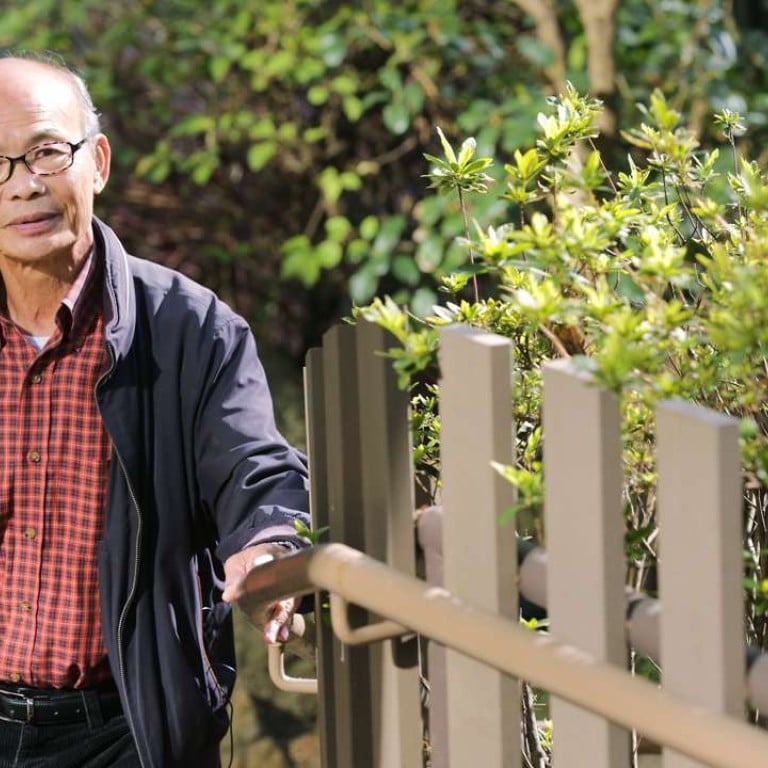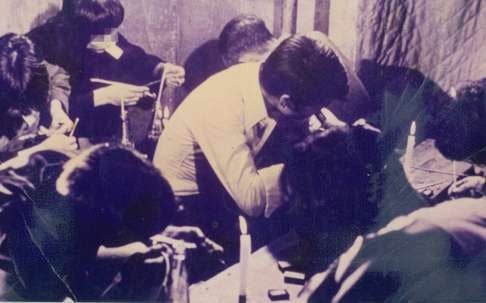
Former Hong Kong triad member reflects on his life from gangster to rehabilitation worker
From the sordid slum that was the Kowloon Walled City, Lee Fai-ping rose to become a leader of the Wu Oi Christian Centre that rehabilitates drug users
Lee Fai-ping first became involved with a triad gang when he was a teenager – and he enjoyed the lifestyle.
Watch: Former Walled City heroin addict now helps teens quit drugs
During the 1960s, while playing football on the grassy fields near his home, he met fellow teenagers who he said “turned out to be triads.” He did not want to be bullied any more, and he was attracted to the idea that he too could have “money and girls”, so he joined them, he said.
By the 1970s, when Lee was in his 20s, he admits he had become “cunning and ruthless” and had started to recruit his own gang members.
“Life was quite happy,” he said. “I had money and I enjoyed a bit of freedom, so I enjoyed life back then.”

But as a gangster, Lee did not have a permanent home, so was forced to spend his days wandering the streets around Wong Tai Sin and Kowloon City.
He recalls being 23 when he first experimented with drugs, mainly opium and heroin while hanging out with other gang leaders. He said he believed drug-taking gangsters were “very powerful”.
“I realise now that was a very wrong concept,” he said. “I took so little at first that I did not think I would get addicted. My uncle did not know anything about it until I was about 25 or 26, and he had to post my bail after I was arrested.”
At the height of his drug-dealing days, he remembers rain flooding his home in the Kowloon Walled City. He focussed on saving his drugs by holding them in the air as water came up to his waist. “This was one of my most painful experiences as a gangster,” he said.
During this period, Lee was in and out of prison about 10 times for robbery, drug offences and extortion. He also made money as a pimp.
“Every time I got out of prison, I wanted to be a good person, but my friends were trying to influence me,” he said.

In 1973, during a stint in Stanley Prison, he tried to hang himself, but the rope snapped and he failed. He said the low point made him reassess the direction his life was going in.
“I heard a voice which said ‘If you have the energy to end your own life, why don’t you use it to help others,” he said.
Soon after, at court, he met a former gangster friend who had successfully turned his life around after attending rehabilitation at the Wu Oi Christian Centre.
It took Lee six months of intensive treatment, but he eventually got clean and was hired as a seller in a dried seafood shop in Sai Wan.
“When I got my first pay packet, about HK$300, I was so happy I cried,” he said.
This was a major turning point for Lee, who was now approaching his 30s. He became a volunteer at the same treatment centre which had cured him of his addiction and dedicated hours to helping other young triads and drug addicts leave crime.
The centre hired him as a full-time rehabilitation worker in 1982. And a year after that, he married his girlfriend, whom he met at church. They went on to have one son, who himself recently married.
Lee began studying counselling and theology to improve his skills. He said he was initially “scared” about how he would be seen by his colleagues, because he came from the same background as his patients, but the centre’s staff were overwhelmingly encouraging. He eventually went on to become the centre’s deputy general secretary.
In 2012, he received a gold medal from the government in recognition of his services, becoming the first former triad member to win such an award. He supported anti-drug publicity activities and travelled overseas to participate in seminars.
He worked with drug addicts for more than 30 years until his retirement in August 2016.
Lee retains a collection of photographs from his triad days, showing him and his friends sampling various drugs, which are being published by the South China Morning Post for the first time.

He puts his success down to his empathetic approach.
“I think the best strategy is always to teach by example,” he said. “What those young people need most is for someone to care about them and in a sense, walk with them.
Even after I quit crime, I do not think I am better than them [gangsters]
“When they come into the centre, they are as thin as skeletons. I am happy when they get better. It is very satisfying. I treat everyone who comes into the centre as my own child. Some of them will come back to my home during the Lunar New Year, and I will be really happy to see them.
“But not everyone who comes to the centre will succeed in quitting a life of drugs. It is really heartbreaking when that happens.”
Lee said he still spoke with friends involved in crime and sometimes bumps into them unexpectedly while walking through areas such as Mong Kok.
“I always tell them to quit that lifestyle,” he said. “They will not argue with me, but they say it is not the right time. Even after I quit crime, I do not think I am better than them.”

